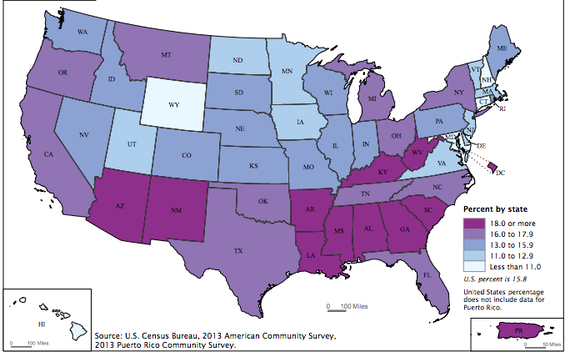How Obama Has Left Red States Deeper in the Red

Pete Souza/White House file photo
Budgets in conservative states have been cut much more than in liberal or swing states.
"There's not a liberal America and a conservative America; there's the United States of America," Barack Obama said at the 2004 Democratic National Convention. That may or may not have been true at the time, but since entering the White House, he's helped to make the division a little more real.
In a fascinating story Wednesday , Reuters asked John Hudak, an expert at the Brookings Institution, to look at how discretionary federal spending had been directed to states since 2009—that is, since the recession, but also since Obama came into office. As one would expect, spending is down, but the effects haven't been uniform. In red states, spending is down 40 percent on average, while blue states and essential swing states (hi, Ohio!) have seen much milder declines, closer to 25 percent.
To be specific, the numbers involve programs where the executive branch decides how to allocate funding, rather than where levels are set by Congress. So, for example, Head Start is included, but Medicaid is not. "I would suggest these numbers would tell us there is politicization going on," Hudak told Reuters. (The Office of Management and Budget replied: "The administration supports allocating federal grants based on objective criteria that will help protect taxpayer dollars and ensure that lawmakers are responsible and accountable to the American people.")
The disparity didn't start with Obama; Hudak has found that there's a similar pattern for previous administrations. But piled onto several other political shifts, the result is yet another factor helping to create a divided America, two increasingly disparate nations separated by philosophy of government, social services, education, and race .
Uneven discretionary spending, perhaps for political reasons, is the start. Add to that a steep drop in state spending and budgets during and after the recession (unlike the federal government, which can take on debt to keep spending up during a recession, most states are required to balance their budgets ).
Legislators used to counteract the executive branch's priorities with earmarks—or, in less flattering terms, pork. In 2011, Congress banned earmarks, on the back of a sweeping victory by conservative lawmakers who campaigned against government spending. For Tea Partiers, refusing to take government cash even for their home districts was a principled stance—refusing to put their money where their mouths were not, in other words. That move has been blamed, among other things, for making party discipline more difficult: Without the prospect of goodies for home districts, party leaders can't force members to get in line. But the inability to balance out White House priorities has been a less-heralded effect.
Meanwhile, conservative lawmakers in red states have made conscious policy choices, sometimes in concert with Democratic priorities, that help to expand the gulf in spending between red and blue states. The Affordable Care Act, as designed, would have been a massive federal giveaway to all states. In practice, however, it has become a massive federal giveaway mostly to blue and purple states. After the Supreme Court ruled that the federal government couldn't force states to accept an expansion of Medicaid for citizens making up to 133 percent of the federal poverty level, many conservatives states chose not to take the expansion. A map of the states that have chosen to accept the expansion ends up looking a lot like a map of the states Obama won or competed in during the 2012 election:
Where States Stand on Medicaid Expansion as of January 27, 2015
The tragedy is that red states tend to be the states that can least afford steep cuts. Red states tend to have higher poverty rates, so the people who need aid most are less likely to get it:

Census Bureau
Of course, these states are making tradeoffs. The states with the highest job-creation rates in the nation in 2014 included a great number of red states.
So on the heels of the deepest recession the nation had seen in decades, with states already slashing budgets, the Obama administration directed funds mostly to blue and purple states. Republican lawmakers, having handcuffed themselves for principled reasons, couldn't plug that hole with appropriations. And other decisions, in concert with a Supreme Court decision, created yet another way for money to flow mostly to blue states. Any of these decisions alone might not have much effect, but together, they produce a big gap. In the context of a nation that is increasingly geographically sorted and in which many states have single-party control , it's another way the nation is split further into two.
Still, there are signs that the current trend isn't sustainable. Take Indiana, where Governor Mike Pence, a conservative Republican, said Tuesday that the state would accept the expansion of Medicaid . It's only the latest example of a sincerely conservative governor deciding to take on serious political liability by compromising with the White House. And it is a compromise: Pence convinced the Obama administration to allow Indiana to make some recipients contribute toward their coverage. The deal has earned the ire of conservatives who accuse Pence of selling out, and of liberals who accuse the administration of, well, selling out.
If you're inclined to believe that radically divergent approaches for the states are a danger to national unity, there's a lot to be worried about. But cases like Indiana offer a little bit of hope.
NEXT STORY: The New Data-Driven Government Equation






